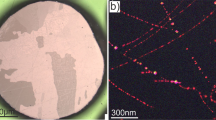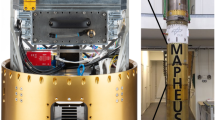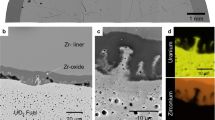Abstract
CAST beryllium is coarse-grained and, consequently, brittle. Much hot working is required to refine the grain structure of a cast beryllium ingot before good ductility is developed. Attempts at grain refining with for example, ultrasonics in the melt and stirring of the melt, have been unsuccessful. Research has also been undertaken (unsuccessfully) to find a grain-refining agent suitable for beryllium1. A good grain refiner must be retained in the melt in the form of fine, dispersed particles. Particles in molten beryllium, however, because of its very low density, agglomerate and segregate from the melt terrestrially. This is believed to be due primarily to Stokes collisions and velocity gradient collisions. As the Stokes velocity is directly proportional to the acceleration due to gravity, the rate of agglomeration and subsequent segregation from the melt ought to be reduced considerably in the microgravity environment of space. We report here the results of an experiment in the weightless environment of space, using a sounding rocket equipped with the NASA electromagnetic containerless processing payload (ECPP), to melt and solidify a specimen of beryllium containing beryllia, an inoculant tried previously as a grain refiner.
This is a preview of subscription content, access via your institution
Access options
Subscribe to this journal
Receive 51 print issues and online access
$199.00 per year
only $3.90 per issue
Buy this article
- Purchase on Springer Link
- Instant access to full article PDF
Prices may be subject to local taxes which are calculated during checkout
Similar content being viewed by others
References
Denney, J. P. & Hessler, B. H. US Air Force Docum. Rep. ASD-TDR-62-390 (1962).
Lindborg, U. & Torsell, K. Trans. met. Soc. AIME 242, 94 (1968).
Levich, V. G. Physicochemical hydrodynamics, 207–230 (Prentice-Hall, Englewood Cliffs, 1962).
Reger, J. L. 3rd Space Processing Symp., Skylab Results, NASA Rep. M-74-5, 1, 133 (1974).
Kawada, T., Takahashi, S., Yoshida, S., Ozaga, E. & Yoda, R. 3rd Space Processing Symp., Skylab Results, NASA Rep. M-74-5, 1, 203 (1974).
Raymond, L. & Ang, C. Y. Space Processing Application Rocket Project, SPAR I Final Rep. NASA TMX-3458, Exp. 74–34 (1976).
NASA-MSFC, Rep. no. M-EH-75-2 (1976).
Wouch, G., Keith, G. H., Frost, R. T. & Pinto, N. P. Final Rep. NASA Contract, NAS8-31963 (June, 1977).
Brandon, D. G. Modern Techniques in Metallography (Van Nostrand, New York, 1966).
Johnson, R. E. Jr. & Dettre, R. H. Surf. Coll. Sci. 2, 85–155 (1969).
Berghezan, A. Materials Science in Space, ESA SP114, 2nd Frascati Symp. 351–365 (1976).
Wolf, S. M. Whisker Technology (ed. Levitt, A. P.) 245–272 (Wiley, New York, 1970).
Sutton, W. H. & Feingold, E. Mater. Sci. Res. 3 (1966).
Author information
Authors and Affiliations
Rights and permissions
About this article
Cite this article
WOUCH, G., FROST, R., PINTO, N. et al. Uniform distribution of BeO particles in Be casting produced in rocket free fall. Nature 274, 235–237 (1978). https://doi.org/10.1038/274235b0
Received:
Accepted:
Published:
Issue Date:
DOI: https://doi.org/10.1038/274235b0
Comments
By submitting a comment you agree to abide by our Terms and Community Guidelines. If you find something abusive or that does not comply with our terms or guidelines please flag it as inappropriate.



